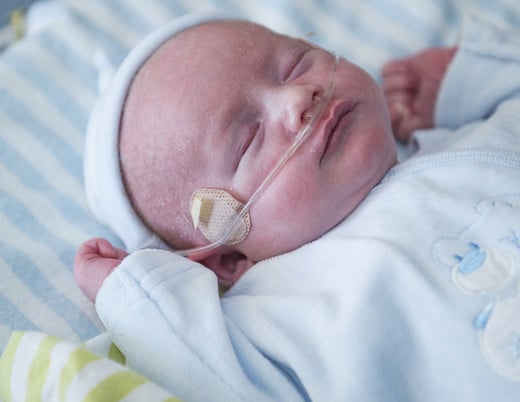Could the widely used drug acetaminophen potentially have harmful effects on premature babies?
Over the last five years, providers in neonatal intensive care units across the globe have increasingly used acetaminophen, to treat patent ductus arteriosus, or PDA, a common heart defect in premature babies. Given the ubiquity of acetaminophen in our lives, most have considered this practice perfectly safe, but for Children’s Colorado neonatologist Clyde Wright, MD, this set off alarm bells. Dr. Wright’s research has long taken an interest in the liver-lung connection, and given acetaminophen’s impact on the liver, he wanted to know more about how it might affect premature lungs.
Neonatal acetaminophen to treat PDA
According to Dr. Wright, the rise in acetaminophen use in extremely premature babies in the NICU began when doctors discovered the common drug’s ability to close PDA’s characteristic gap between the two blood vessels leading away from the heart. This condition previously was treated using nonsteroidal anti-inflammatory drugs, or NSAIDs, which come with some difficult side effects, making acetaminophen a welcome substitute. As a result of this change, some recent studies indicate that 70% of premature babies in the NICU are prescribed acetaminophen.
“People are looking at acetaminophen in these premature babies and saying, ‘It’s safe. We don’t see any liver injury,’ which is true,” Dr. Wright says, “but no one was looking at the lungs.”
Dr. Wright is doing just that through a nearly $3 million grant from the National Institute of Child Health and Human Development. The grant will allow him to further study whether acetaminophen adversely impacts lung development and better understand the mechanism by which lung injury might occur.
The role of CYPE2E1 expression
Here’s what we know: When an adult takes acetaminophen for a headache or muscle soreness, the liver breaks it down into nontoxic metabolites. But when an overdose occurs, the pathways the liver uses to create that nontoxic metabolite become overwhelmed and another enzyme, CYP2E1, comes into play. CYP2E1 turns acetaminophen into a mitochondrial toxin that can cause significant cell death and, ultimately, liver necrosis. That same enzyme is expressed in high levels in the developing lung. Whether CYP2E1 expression in the developing lung causes cellular injury is still unknown.
“When you think of acetaminophen and organ injury, you think of the liver,” Dr. Wright says. “So, in the lab, I started to ask, ‘If I injured the liver with acetaminophen, what would happen to the lungs?’”
Exploring the pulmonary effects of acetaminophen
Dr. Wright and his team devised a series of research projects to explore the potential adverse pulmonary effects of acetaminophen use in premature babies. In the first of three studies, the team used preclinical models to determine how acetaminophen exposures that were sure to injure the liver impacted the mature lung. That research yielded notable results: significant cell death in the airways and alveolar injury.
This laid the foundation for the second study, which found that even with a smaller acetaminophen exposure — one that resulted in no liver toxicity — the lungs still showed signs of injury. Finally, the team used a preclinical model to mimic exposures early in lung development. The team found that the neonatal liver was resistant to acetaminophen exposures that typically cause liver injury in adults. However, the developing lung demonstrated both metabolic and structural changes. The team continues to work to understand if these changes impact long-term lung function.
“What we learned was that the neonatal liver handles these acetaminophen exposures quite well, however, the lung has a unique metabolic and immunologic response not previously appreciated,” Dr. Wright explains. “We need to know why this is happening, and if it causes any long-term problems.”
Future research of acetaminophen toxicity on lung development
His latest study, funded by the NICHD grant, will use preclinical models to examine the impact of perinatal acetaminophen exposures on early lung development. Further, he is working to demonstrate and more clearly understand the mechanisms behind these results to illuminate potential solutions.
“My hope is we can really understand what these enzymes are doing, why they are being expressed in the developing lung and what this tells us about the metabolic forces that drive lung development, and maybe give us some other therapeutic targets to help these babies that are born preterm,” Dr. Wright says. “We are working hard to make sure that the medications we use in these high-risk babies are both safe and effective.”
Featured Researchers

Clyde Wright, MD
Neonatologist
Neonatal Intensive Care Unit
Children's Hospital Colorado
Professor
Pediatrics-Neonatology
University of Colorado School of Medicine





 720-777-0123
720-777-0123










